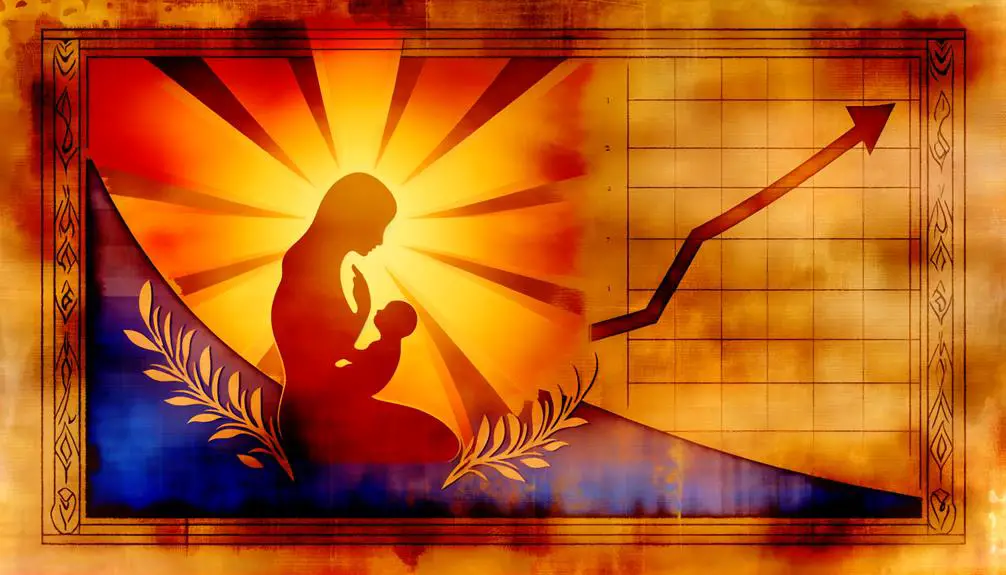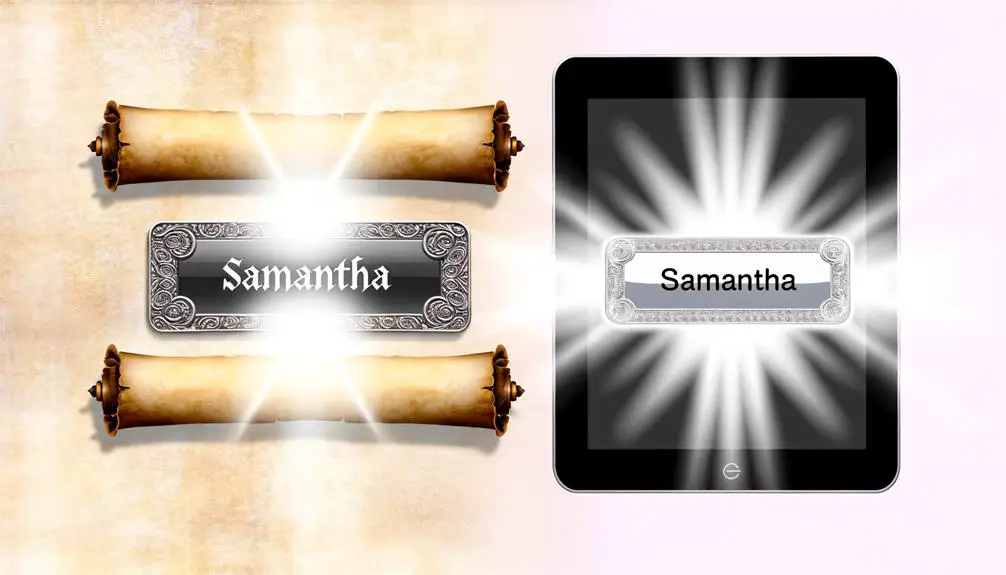Samantha's biblical roots are shrouded in mystery, sparking curiosity about its true meaning and connection to ancient scriptures.

What Does Samantha Mean in the Bible
In the garden of names, 'Samantha' blooms with ambiguity, especially when you seek its roots in the Bible.
You might find yourself navigating through a labyrinth of misconceptions about its biblical presence, questioning how a name so modern could be linked to ancient scriptures.
While the name Samantha carries a charm that has seen its popularity soar, the real intrigue lies in its supposed biblical connections—or the lack thereof.
Unraveling this mystery not only sheds light on Samantha's actual meaning but also invites you to explore the fascinating journey of a name that has captivated many, yet remains an enigma in biblical context.
Key Takeaways
- Samantha does not originate from the Bible or have a biblical meaning.
- The name Samantha is a blend of names, showcasing linguistic creativity, not scriptural reference.
- Misunderstandings about Samantha's biblical origins stem from misconceptions, not historical fact.
- Samantha's etymology is linked to English origins, reflecting a mix of Hebrew and Greek influences.
The Origins of Samantha

Delving into the origins of Samantha, it's essential to understand that this name doesn't directly appear in biblical texts, despite widespread belief. The name's etymology and linguistic roots reveal a fascinating journey of cultural and linguistic evolution, rather than a straightforward derivation from ancient scriptures. To fully grasp the origins of Samantha, you're encouraged to explore its etymological foundation and the linguistic pathways it has traversed.
The etymology of Samantha is somewhat contested among scholars, yet it's widely accepted that the name is of English origin, emerging during the 17th or 18th century. Its formation is likely a blend of the names Samuel and Anthea, with Samuel being of Hebrew origin, meaning 'God has heard,' and Anthea of Greek origin, meaning 'flower' or 'blossom.' This blending of linguistic roots underscores the name's rich cultural tapestry and highlights the creative process behind naming practices.
Linguistic roots play a crucial role in understanding Samantha's origin. The name's construction exemplifies a phenomenon known as a portmanteau, where two distinct words are combined to create a new word or name. This process isn't unique to English but is found across languages, reflecting the dynamic and evolving nature of human communication and naming conventions.
In analyzing Samantha's origins, it's critical to approach it through the lens of name etymology and linguistic innovation. This perspective sheds light on the name's creation and its journey through history, devoid of a direct biblical lineage. By examining its etymological background and linguistic roots, you gain a deeper appreciation for the name's complexity and cultural significance.
Misconceptions About Its Biblical Presence

You may hold beliefs about the name Samantha's biblical origins, but it's crucial to unravel the layers of misunderstanding.
First, we'll clarify its origin and how it's often mistakenly associated with biblical names.
Then, we'll address common interpretation errors and debunk myths about its biblical significance, ensuring an accurate understanding of its true context.
Origin Clarification
Despite common misconceptions, the name Samantha doesn't have a direct origin or mention in the Bible. This misunderstanding stems from a lack of awareness about language evolution and naming trends over centuries.
It's crucial to recognize that names, like languages, evolve. Naming trends reflect cultural, historical, and linguistic shifts, often adapting elements from different origins. The emergence of the name Samantha is a product of such evolution, rather than a direct derivation from biblical texts.
Understanding this context helps clarify why asserting Samantha's biblical origin is misguided. It's a modern name, influenced by naming conventions and trends, without a direct link to ancient biblical names or narratives. Therefore, its supposed biblical roots are more about linguistic creativity than historical accuracy.
Common Interpretation Errors
Many people mistakenly believe that the name Samantha has biblical origins due to common interpretation errors and a lack of understanding of historical naming conventions. This misunderstanding primarily stems from translation challenges and the contextual importance often overlooked in scriptural texts.
Translation challenges can mislead individuals into correlating modern names with ancient texts, where direct equivalents are rare and the process is fraught with complexities. Additionally, the contextual importance of names within the Bible is pivotal, serving not just as identifiers but also carrying deep theological and cultural significance. Without a nuanced appreciation of these aspects, it's easy to misconstrue the presence or significance of names, leading to widespread but incorrect assumptions about their biblical roots.
Biblical Name Myths
Exploring the widespread belief, it becomes evident that the name Samantha, often thought to have biblical origins, doesn't appear anywhere in the scriptures, revealing a common myth rooted in misunderstanding and misinterpretation.
This misconception underscores the importance of historical accuracy and a deep dive into name etymology when tracing the origins of names assumed to be of biblical descent.
By examining the roots and evolution of the name Samantha, scholars have concluded that it likely originated in the 18th century, far removed from biblical times.
This analysis dispels the myth of its scriptural presence, showcasing the critical role of rigorous research in distinguishing fact from fiction within the realm of biblical name myths.
Samantha's Actual Meaning

You must now consider Samantha's actual meaning, starting with its origin, which is frequently misunderstood or misrepresented in discussions about its biblical relevance.
The debate over its biblical significance is complex, intertwining linguistics with historical and cultural analyses.
This exploration will clarify misconceptions and illuminate the name's place within or outside biblical contexts.
Name's Origin Explained
Delving into the origins of the name Samantha reveals it doesn't have a direct biblical lineage, contrary to popular belief. This discovery prompts an exploration into its etymology and cultural significance, touching upon themes of gender roles and linguistic evolution.
Consider the following points:
- Gender Roles: Samantha's emergence highlights shifts in societal gender expectations, reflecting broader changes.
- Linguistic Evolution: The name's adaptation over time showcases the dynamic nature of language and naming conventions.
- Cultural Significance: Samantha carries with it cultural implications that transcend its etymological roots, becoming a symbol of modernity.
- Historical Context: Its usage and popularity provide insights into historical periods and social dynamics, offering a lens through which to view past gender norms.
This analysis underscores the complexity of names and their meanings within societal contexts.
Biblical Significance Debated
While the name Samantha may not trace directly back to biblical origins, its perceived spiritual significance still sparks debate among scholars and theologians.
Delving into name etymology, some argue that the absence of Samantha from Scriptural references doesn't negate its spiritual value, suggesting that modern interpretations can imbue the name with biblical principles.
On the other side, critics argue that without explicit Scriptural backing, assigning biblical significance to Samantha is speculative at best. This debate underscores a broader discussion on how names are connected to faith and spirituality, especially ones not originally found in religious texts.
Ultimately, the significance of Samantha in a biblical context remains a matter of personal belief, influenced by individual interpretations of name etymology and the relevance of Scriptural references.
The Name's Rise in Popularity

The rise in popularity of the name Samantha, particularly in Western cultures, can be attributed to various social and cultural factors during the 20th century. This period marked a significant evolution in naming trends, with a noticeable shift towards more unique and diverse names. Celebrity influence also played a crucial role, as names associated with popular figures often saw a surge in adoption.
As you delve into this analysis, consider the following elements that contributed to the increase in the name's popularity:
- Changing Naming Trends: The 20th century witnessed a shift away from traditional names towards more distinctive ones, with parents seeking unique identities for their children. Samantha, with its soft consonants and strong ending, fits neatly into this trend.
- Celebrity Influence: The name gained significant traction following the popularity of characters named Samantha in movies, television shows, and books. This visibility in the entertainment industry greatly influenced naming choices.
- Cultural Shifts: As societal norms evolved, so did the desire for names that reflected new values of individuality and freedom. Samantha, being relatively uncommon at the beginning of the century, offered a fresh alternative to more conventional names.
- Globalization: The latter half of the 20th century saw increased cultural exchange, with names crossing borders more freely. Samantha's appeal in various English-speaking countries contributed to its rise in popularity, as it was easily adopted in different cultural contexts.
Analyzing these factors offers insight into the dynamics of naming practices and the influence of broader societal trends on personal choices.
Cultural Significance and Adoption

Exploring the cultural significance and adoption of the name Samantha reveals its reflection of broader societal values and individual identity quests. Naming practices are deeply ingrained in cultural traditions and the choice of a name like Samantha speaks volumes about cultural adaptation and the evolution of societal norms. You'll find that as societies become more interconnected, the adoption of names from one culture by another becomes a testament to this blend and mutual respect.
Samantha, though not originating from the Bible, has been embraced widely across different cultures, showcasing a fascinating journey of cultural adaptation. This journey isn't just about the name but also about the values and stories that communities choose to embrace and pass down through generations. It's a mirror reflecting how societies evolve, adopting elements from each other to create a rich tapestry of human experience.
As you delve deeper, you'll notice that the name's adoption across various cultures also highlights a quest for individuality within the framework of societal norms. Parents looking for a unique yet meaningful name often settle on Samantha, indicating a desire to give their child a name that stands out yet is rooted in a sense of belonging and cultural richness.
Through this lens, the adoption of the name Samantha becomes more than just a trend. It's a marker of cultural fluidity and the ongoing dialogue between tradition and individual identity. It underscores how naming practices are both personal decisions and reflections of broader cultural dynamics, showcasing the ongoing dance between tradition and innovation.
Famous Samanthas in History

Delving into the annals of history, we encounter several prominent figures bearing the name Samantha, each contributing uniquely to their respective fields. The name, with its variations, has adorned individuals who've made their mark in various domains, demonstrating the diversity and adaptability of those who carry it. Analyzing these figures not only enriches our understanding of the name's impact but also underscores the importance of historical accuracy in documenting their achievements.
- Samantha Smith – A young peace activist from the United States who became famous during the Cold War era for her correspondence with the Soviet Union's leader, thus symbolizing a beacon of hope during tense geopolitical times. Her story illustrates the power of youthful innocence in bridging formidable divides.
- Samantha Power – Serving as a United Nations Ambassador and a member of the National Security Council, she's played a pivotal role in shaping international policies and human rights advocacy. Her career exemplifies the influence one can wield on the global stage, underscoring the significance of diplomacy and ethical governance.
- Samantha Fox – An English singer, songwriter, and former model, she rose to prominence in the 1980s. Her career trajectory highlights the intersection of talent and opportunity, showcasing the dynamism inherent in the entertainment industry.
- Samantha Stosur – An Australian professional tennis player known for her powerful serve and formidable performances on the court. Her achievements in sports underscore the dedication and perseverance required to excel at the highest levels of athletic competition.
Each Samantha variation found in history provides a unique lens through which we can appreciate the multifaceted contributions of individuals to their fields, reinforcing the value of historical accuracy in capturing their legacies.
Samantha in Modern Times

Building on the historical significance of the name Samantha, it's crucial to examine its contemporary relevance and the impact of those who bear it today. Samantha's symbolism, deeply rooted in tradition, has evolved, reflecting modern sensibilities and cultural shifts. As you delve into modern naming trends, you'll find that Samantha has maintained a steady presence, signifying not just a nod to the past but also an embrace of the qualities it's come to represent: strength, versatility, and grace.
In analyzing modern naming trends, it's evident that parents are drawn to names that offer both a sense of heritage and adaptability. Samantha fits this bill perfectly, bridging the gap between tradition and the contemporary world. Its ability to be both timeless and trendy has cemented its place in the hearts of many, making it a popular choice across various cultures and communities.
Moreover, the impact of individuals named Samantha in various fields – be it in the realms of science, arts, or leadership – further enhances the name's modern allure. Their achievements and contributions to society underscore Samantha's symbolism of capability and resilience, inspiring a new generation to carry the name with pride and purpose.
Reflecting on Name Meanings

In considering the meanings behind names, it's essential to recognize how they reflect individual identities and cultural narratives. The study of name psychology provides a fascinating lens through which we can understand the profound impact that names have on personality development, social interactions, and even career paths. Cultural perceptions of names add another layer of complexity, shaping the way societies assign value and expectations to individuals based solely on their given names.
- Historical Legacy: Names often carry the weight of historical significance, embodying the virtues, struggles, or achievements of ancestors. This connection can imbue a sense of pride or responsibility in the bearer.
- Cultural Identity: Through names, one can trace the roots of their heritage, offering insights into familial traditions, linguistic peculiarities, and geographical origins.
- Personal Narrative: A name can encapsulate personal stories or aspirations that parents project onto their children, setting the stage for an individual's self-concept and life trajectory.
- Social Perception: The way a name is received within a community can influence social dynamics, including inclusivity, biases, and stereotypes, thereby shaping a person's social experiences and opportunities.
Understanding the multifaceted implications of names encourages a deeper appreciation of the roles they play in shaping human experiences. It's not merely about the aesthetics or the phonetic appeal; names are a confluence of historical, cultural, and personal narratives that contribute to the complex tapestry of human identity. As we delve into the origins and meanings of names, we uncover layers of human psychology and cultural perceptions that are otherwise overlooked.
Frequently Asked Questions
How Does the Name Samantha Vary in Pronunciation and Spelling Across Different Cultures and Languages?
The name Samantha varies significantly in pronunciation and spelling across cultures and languages. Your pronunciation guide reveals fascinating cultural variations.
For instance, in English-speaking countries, you'll often hear it pronounced as /sə-MAN-thə/, whereas in Spanish-speaking regions, it might sound more like /sa-MAN-ta/. Spellings can diverge too; some cultures may add or omit letters, reflecting local linguistic norms.
This diversity underscores the rich tapestry of global naming practices and their deep-rooted cultural significance.
Are There Specific Biblical Passages or Stories That Have Been Interpreted to Subtly Reference the Qualities Associated With the Name Samantha?
You're diving into whether specific biblical passages subtly reference qualities associated with the name Samantha. Analyzing name origins and cultural significance sheds light, but it's crucial to note that direct links to the Bible may not be straightforward.
Samantha's etymology and its cultural footprint could suggest symbolic meanings. However, identifying explicit biblical stories or verses directly tied to the name's attributes requires a scholarly, objective approach, considering its modern usage and historical context.
What Are Some Lesser-Known Professions or Roles in Society Where Individuals Named Samantha Have Made Significant Contributions?
You mightn't immediately think of space exploration or culinary innovation when considering where individuals named Samantha have left their mark, but they've indeed made significant contributions in these fields.
In space exploration, some Samanthas have been part of teams pushing the boundaries of our knowledge of the universe.
Meanwhile, in the culinary world, they've been at the forefront of innovation, blending traditional techniques with modern flavors to create new culinary experiences.
Can the Name Samantha Be Linked to Any Specific Symbols or Motifs in Religious Texts Outside of the Bible?
You're exploring whether the name Samantha carries specific symbolism or motifs in religious texts beyond the Bible.
While 'Samantha' isn't directly linked to ancient scriptures, its meaning and the cultural motifs it evokes can still offer insight. Analyzing its etymology and usage in various cultures reveals how names encapsulate beliefs and values.
Samantha's symbolism, therefore, isn't tied to a single narrative but reflects broader human themes of wisdom, beauty, and strength across different societies.
How Have Perceptions of the Name Samantha Evolved in Religious Communities Over the Past Few Decades?
In recent decades, you've likely noticed how perceptions of the name Samantha have morphed within religious circles. Modern interpretations have danced alongside naming trends, showcasing a blend of amusement and solemnity.
As naming trends evolve, Samantha's reception in these communities has shifted from rigid traditionalism to a more fluid, open interpretation. Analyzing this shift, it's clear that societal changes significantly influence the acceptance and significance of names like Samantha in religious contexts.
Conclusion
In sum, while Samantha's biblical roots are a common misconception, its true origins and meaning reflect a broader cultural significance.
Its rise in popularity and the proliferation of notable Samanthas underscore its appeal.
Despite not being found in the Bible, the name carries weight in modern contexts, illustrating how names evolve and adapt over time.
As the saying goes, 'what's in a name?'—a lot, when delving into the layers of history, culture, and individual identity that names like Samantha embody.



Sign up